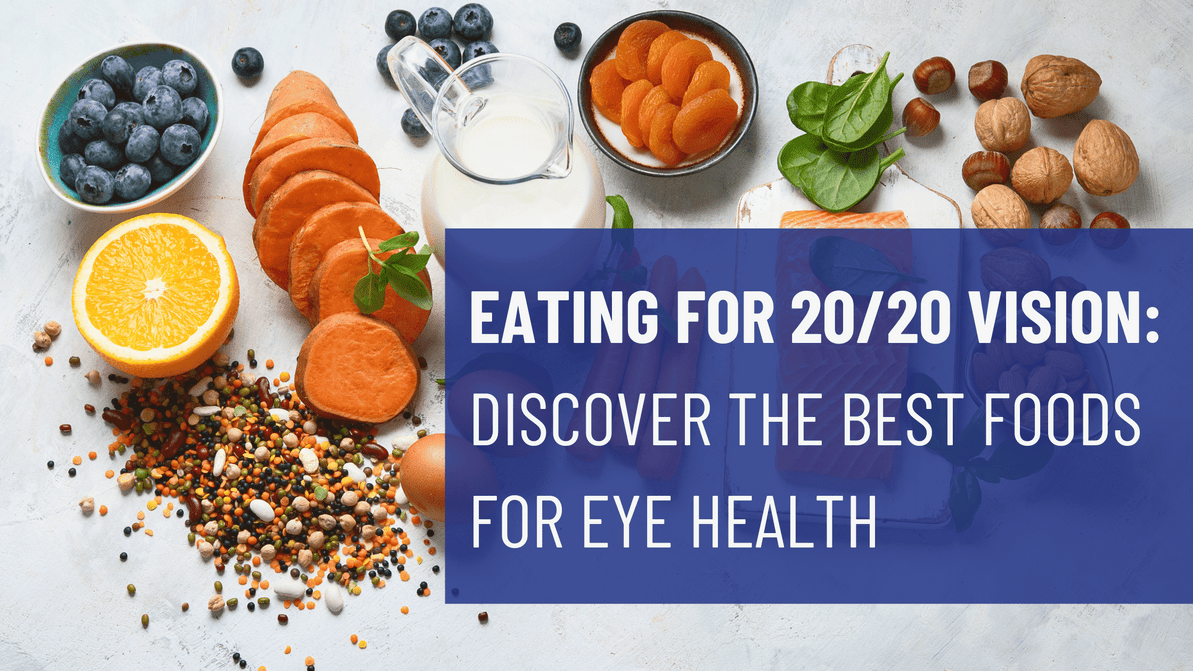Eating for 20/20 Vision: Discover the Best Foods for Eye Health
You wake up and check your phone. Then spend hours in front of the computer for work. In between, you check your phone several times. And let’s not forget about driving, because you have to get places. Finally, you have to end the day with a nice relaxing movie or a book.
That’s an average day for someone living in this day and age. All these activities have one thing in common: they can strain your eyes. Blue light and focusing for long periods with little blinking can seriously damage your eyesight. Thankfully, small lifestyle changes can help.
Taking frequent breaks, blocking out blue light, and spending time outside will relax your eyes. But what if I told you nutrition could also be your ally? Let’s talk about the best foods for eye health, nutrients, vitamins, and minerals that support your vision.

Key nutrients for eye health
You are what you eat? Maybe not exactly. But when it comes to eye health, there are certain key nutrients you should look out for.
They may not heal eye conditions completely or reduce your genetic risk of things like cataracts or glaucoma, but they can protect your eyes and even keep some diseases at bay.
1. Vitamin A
You may have heard that vitamin A is good for your eyes. But did you know severe and prolonged vitamin A deficiency can lead to blindness? Less severe symptoms include dry eyes or night blindness.
If you eat animal products such as egg yolks, liver, and dairy products, your risk for severe deficiency is minimal, as these foods are rich in vitamin A.
If you’re vegan, pay attention to your diet. Foods like kale, spinach, and carrots contain beta-carotene, which the body can convert into vitamin A. It’s also known as provitamin A, and its effects on the body are similar to those of vitamin A from animal products.
Should you supplement? Depending on your lifestyle, you can, but it may not be necessary. Consult with a physician before supplementing. A multivitamin that contains some vitamin A will probably be harmless. But larger doses can cause problems, including hair loss, dry skin, and headaches.
2. Lutein
Lutein is an antioxidant and is crucial to eye health. It can:
- Protect your eye from blue light and sunlight damage
- Reduce inflammation
- Improve contrast sensitivity
- Reduce your risk of developing myopia (nearsightedness)
- Reduce symptoms of dry eyes
Studies have also shown that people who don’t get enough lutein in their diets are at a higher risk of cataracts.
The great news is that you can get your lutein from animal and plant-based foods. These include egg yolks, kale, spinach, corn, and more.
Supplements can also help. Lutein is generally considered safe, and it doesn't have side effects when taken in the correct doses.
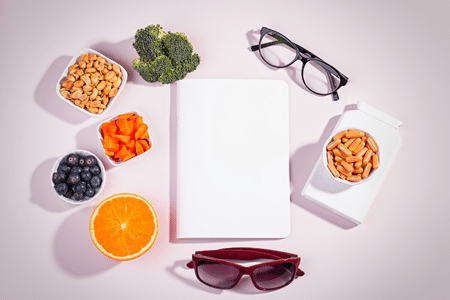
3. Omega-3 fatty acids
You’ve seen omega-3s on many “nutrients you must eat” lists, and here’s one more list they belong to.
Omega-3 fatty acids, specifically EPA and DHA, can ease dry eye symptoms. They can also fight against diabetic retinopathy.
Eating fish and seafood and supplementing are great options for getting enough omega-3 fatty acids in your diet.
If you’re allergic to seafood, supplements are a great option but check with your doctor to make sure you’re taking the right products for you.
4. Other notable nutrients
Vitamin A, lutein, and omega-3 fatty acids may be the best-known nutrients for eye health, but they’re not the only ones.
- Zeaxanthin is an antioxidant that you’ll often see in supplements alongside lutein. The even better news? You’ll find it in almost the same foods as lutein. The two nutrients together can protect against macular degeneration, help reduce the incidence of eyestrain and dry eye symptoms, and more.
- Vitamin E protects your cells against free radicals, and it may keep your eyes safe from sunlight and even blue light damage and could reduce the risk of macular degeneration. Some studies state evidence for its benefits is still insufficient, but we do know severe vitamin E deficiency can cause blindness.
- Vitamin C is another antioxidant crucial for eye health. For instance, some studies suggest people with cataracts have low antioxidants, including vitamin C. If you’re eating a balanced diet, true deficiency is rare. But foods rich in vitamin C are some of the healthiest you can find, so eating more won’t hurt.
Zinc may protect the eyes against macular degeneration. The proof lies in a study conducted on patients who were experiencing early symptoms. The disease can’t be stopped, but zinc supplementation slowed its progression.
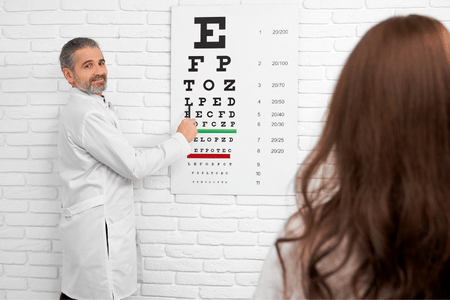
Best foods for eye health
We’ve talked about the key nutrients for healthy vision. Now let’s take a closer look at the best foods for eye health.
1. Fish
After reading about omega-3s and their role in eye health, you probably expected fish to be high on this list. Salmon, especially the wild variety, is the best type for your eyes. If you’re not a fan of salmon, you can also try:
- Tuna
- Mackerel
- Sardines
- Herring
- Trout
2. Nuts and seeds
Rich in omega-3 fatty acids and vitamin E, snacking on nuts and seeds is a great way to keep your eyes healthy. Which ones to choose? Whichever ones you like. But if you’re looking for the ones with the highest levels of omega-3s and vitamin E, here are the best ones:
- Walnuts
- Cashews
- Brazil nuts
- Almonds
- Chia seeds
- Flax seeds.
3. Eggs
Eggs are high in vitamin A, zinc, lutein, and zeaxanthin. In short, they contain almost every key nutrient for eye health. If you prefer egg whites, try not to skip the yolk.
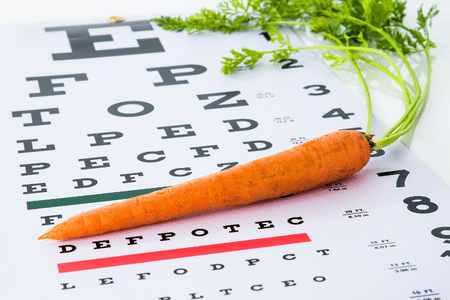
4. Leafy greens
Greens, especially kale and spinach, are very high in vitamin C. Plus, they contain lutein and zeaxanthin, so include them in your diet as often as possible. Don’t like their taste raw? Add them to smoothies or use them as ingredients in soups and other dishes.
5. Sweet potatoes and carrots
These foods contain high levels of beta-carotene. So if you want more vitamin A in your diet without eating so many animal products, sweet potatoes and carrots are your friends.
6. Citrus fruits
Fancy a bit of vitamin C? Then, citrus fruits are your friends. They also contain plenty of vitamin E, so your eyes are in for a treat. Whether you like oranges, lemons, or grapefruits, they all support eye health through a high dose of good nutrients.
7. Beans and legumes
Beans and legumes are excellent sources of vitamin C, zinc, and more nutrients that promote optimal health. Plus, they can help balance blood sugar levels, which is helpful if you’re fighting diabetes.
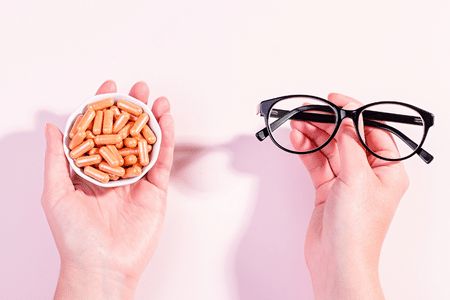
Key takeaways
Your eyesight is one of your most important senses. But the modern lifestyle can put quite a strain on it. Let’s face it. We weren’t meant to spend 8+ hours a day in front of the computer. Small lifestyle changes can make a difference. But so can nutrition.
What are the best foods for eye health? First, look at the key nutrients to include in your diet. Vitamin A, lutein, zeaxanthin, omega-3 fatty acids, and zinc are just some of them. So if you want to get more of them through your diet, be sure to eat nuts, seeds, beans, legumes, leafy greens, carrots, but also fish and eggs.
Getting nutrients from foods is best, but supplements such as Vision Support can sometimes provide a much-needed boost. With a powerful blend of antioxidants, vitamins, and minerals, it supports eye health, especially when you just can’t take a break from looking at the screen. Supporting your eye health doesn’t have to be complicated!
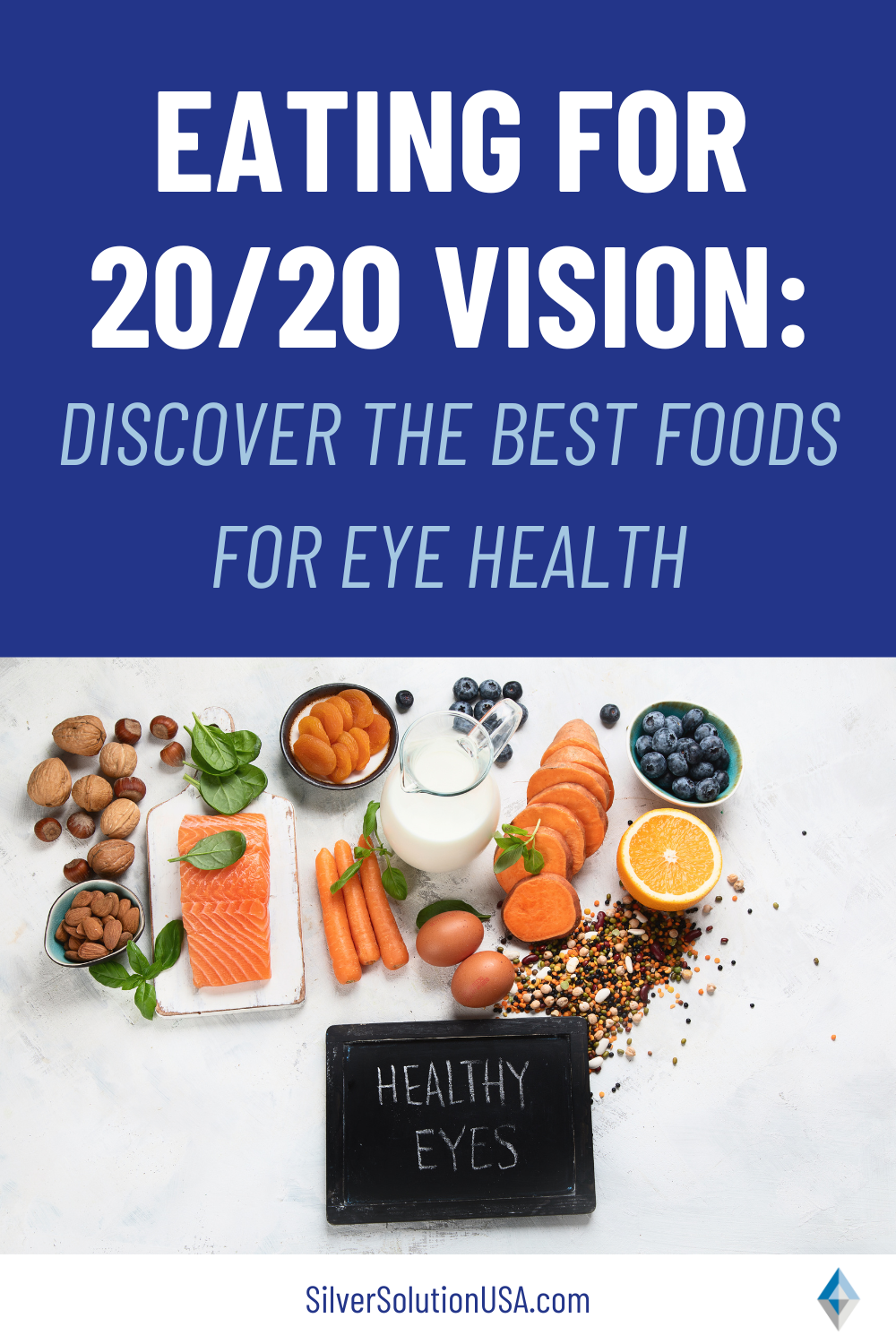
Health/Medical Disclaimer
This blog post does not provide health or medical advice. This blog post is for informational and educational purposes only and is not a substitute for professional health or medical advice. Before taking any actions based upon such information, we encourage you to consult with the appropriate medical and healthcare professionals. We do not provide any kind of health or medical advice. The use or reliance of any information contained on this blog is solely at your own risk.
Sources
https://pubmed.ncbi.nlm.nih.gov/3090484/
https://www.ncbi.nlm.nih.gov/pmc/articles/PMC3936686/
https://www.ncbi.nlm.nih.gov/pmc/articles/PMC4800098/
https://pubmed.ncbi.nlm.nih.gov/16936087/
https://pubmed.ncbi.nlm.nih.gov/27817918/
https://pubmed.ncbi.nlm.nih.gov/27541690/
https://pubmed.ncbi.nlm.nih.gov/18789910/
https://pubmed.ncbi.nlm.nih.gov/7796601/
https://pubmed.ncbi.nlm.nih.gov/1993036/
https://pubmed.ncbi.nlm.nih.gov/3277606/
Recent Posts
-
Are sunscreen ingredients harmful?
Sunny days can bring a lot of fun. Going out for a swim, spending time in nature, or relaxing on the …18th Mar 2024 -
The Veggie Debate: Does Cooking Vegetables Destroy Nutrients and the Best Ways to Cook Them
Vegetables are one of the healthiest foods you can choose. Some people downright hate them, while so …4th Mar 2024 -
Best Foods for COVID Recovery and Prevention
A few years ago, a new virus took the world by surprise. COVID-19 may look like the flu on the surfa …19th Feb 2024

